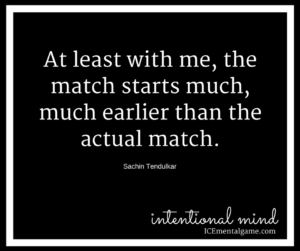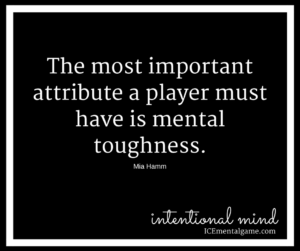 You are a competitive athlete and want to get ahead of the competition. You wonder what you can do that is different, that can distinguish you from everyone else.
You are a competitive athlete and want to get ahead of the competition. You wonder what you can do that is different, that can distinguish you from everyone else.
You are working hard physically. You practice your elements, run your programs, take dance and off ice conditioning.
You hire the best coaches, travel to the best competitions to test yourself against the best competitors and get feedback from the best judges.
But something is still missing.
If you want to pull ahead of the competition—then do something different.
At the highest levels, there is often little difference in types of the skills competitors have.
Sometimes, the only difference between who reaches the podium from one competition to another is how mentally prepared the athlete is that day.
Athletes and parents spend astronomical sums of money on ice time, coaching and specialists. Anything that takes place on the ice comes first, then the off ice programs that will build bodies for the on ice activities are of lower priority.
Mental game training is rarely given second look until there is a problem.
Skating is at least 50% mental. Many skaters and coaches say it is much more like 70-90% mental.
What do you think?
What percent of your training includes the mental aspect?
If you have followed any National or international level competition in any sport including skating, you probably noticed that many successful athletes reveal in interviews that working on their mental game has helped make them successful.
In my experience many developmental skaters and athletes don’t make time to work systematically work on their mental game unless they have problems early on. Many wait until problems show up, usually when they hit adolescence or when they start competing at the higher levels before they seek help.
Instead of being proactive and building a strong mental game foundation, they are reactive and end up putting out fires to salvage a season.
If you want to have the edge over your competitors, start working on your mental game now. It takes time and discipline to learn to practice strategies that will allow you to skate your best consistently.
When you allow time to practice these strategies, they become a part of your natural routine, and are integrated into your training. They become automatic and one less thing to think about when you get to competitions that can make or break your season.
Competitive athletes want to win. Not many competitors have a long term goal of being in the middle of the pack.
Here are some examples of strategies that will help you prepare to win.
An essential component to a successful competition is a Pre-Competition Routine.
Routines help you to:
- Prepare your mind for the task ahead.
- To stay focused when you are competing.
- Be Present: Helps to keep your attention on what you are doing at the moment so your mind doesn’t stray to negative thoughts, doubts or outcomes.
- Confidence: Increases your confidence by decreasing the number of decision you need to make which conserves your mental energy and decreases stress about making the wrong decision.
- Consistency: Knowing and practicing your Pre-Competition Routine prepares your mind and body to produce more consistent performances.
- Trust: Lets you know that it’s time to trust in your skills. The time to practice is done and now is the time to allow your body to execute from motor memory (automatically).
Pre-competition routines can start when you wake up the morning of a competition if you are an elite skater, or they can begin the minute you walk in the door of the rink.
You might already have a Pre-Competition Routine.
For example:
- You put on your skates after your off ice warm up and sit quietly with your eyes closed and take deep breaths before you get on the ice.
- You do your off ice warm up, walk through your program, drink water, get your skates on.
- In the car you visualize your program, plan what you are going to practice on the ice, what you are going to work on, get to the rink, turn off your phone start to warm up.
Practice your bulletproof pre-competition routine daily.
If you don’t have one, create one.
If your next competition is close, stick to doing things in a way that is similar to what you do everyday in practice. Then after this competition, get your pre-competition routine in place!
It won’t take long for you to see how much this simple mental game strategy can improve your performance in practice and competition.
Mental skills training can help to keep your emotions on an even keel so that you can practice and compete your best.
Start here; download “Confidence Myth Busters,” a complimentary eBook and make a change.
